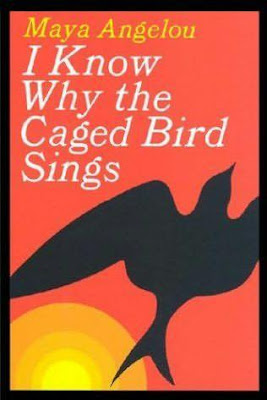
"If growing up is painful for the Southern Black girl, being aware of her displacement is the rust on the razor that threatens the throat. It is an unnecessary insult."
I Know Why The Caged Bird Sings, the first volume of Maya Angelou's six-part autobiography, charts the writer's life from childhood to parenthood. The book explores many very big themes, including racism and sexuality, as Angelou begins to develop a sense of identity, finding at several points that her conception of herself is at odds with the way that others see her and often dependent on where she is and with whom (through the course of the story she lives in Arkansas with her grandmother, St. Louis and later San Fransisco with her mother, and spends a brief period in southern California with her father).
At the age of eight she is raped by her mother's boyfriend, an event which shades the rest of the story. Aside from the obvious physical trauma, the violation also has continuing psychological effects which hinder her ability to relate to the world around her. After her rapist is murdered, Angelou is convinced that his death is a result of a lie she told during his trial (that the rape was the first sexual contact she'd had with him), that her words have the power to kill, and takes a vow of silence which lasts for several years. Importantly, her muteness is broken in part by her engagement with literature, by the encouragement she receives to read aloud. Literature specifically, and Angelou's love of learning generally, play a large role throughout the story as her identity shifts and is shaped as she grows from a girl to a woman.
Angelou writes with intense frankness and the images she creates are vivid. Her style is very engaging and though there is much pain throughout the story, there are also moments of humor and it ends on such a hopeful note that it cannot be considered a work of despair.
As a slight aside, it's interesting to read this book so soon after having read Jamie Ford's Hotel on the Corner of Bitter and Sweet, as part of Angelou's story deals with the World War II period in San Fransisco, including touching briefly on the Japanese internment. It makes for an interesting contrast of impressions of a city (and country) in the midst of sweeping changes.
No comments:
Post a Comment